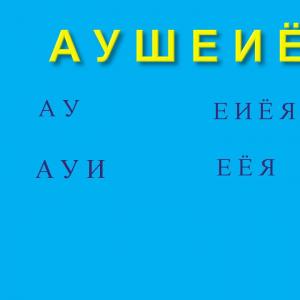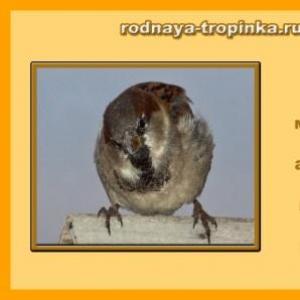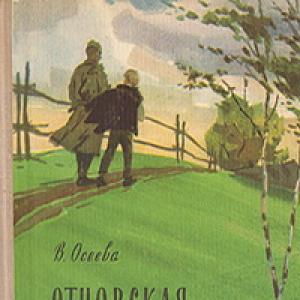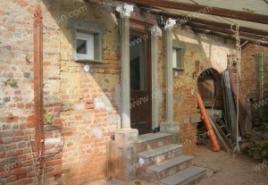All about the alphabet. Presentation "Live alphabet
Back forward
Attention! The slide preview is for informational purposes only and may not represent the full extent of the presentation. If you are interested in this work, please download the full version.
- create conditions for working in pairs, when studying new material;
- develop intellectual skills: analyze, systematize, draw conclusions;
- introduce a new sound and letter;
- develop speech skills, observation, creativity;
- develop interest in the native language.
Type of lesson: lesson learning new material.
Technology: differentiated, multimedia.
Methods: heuristic, verbal, visual.
Equipment: multimedia projector, presentation, primers, copybooks, E. Uspensky's book "Crocodile Gena and his friends".
During the classes
I. Organizational moment. (Slide 1)
A cheerful bell rang
We start our lesson
I know that you are inquisitive children
You want to know about everything in the world.
Guys, smile at each other,
After all, a good mood is the key to success.
II. Knowledge update. (Slide 2)
Letters on the board: a, y, e, i, e, i, sh.
- Name the letters.
What letter is missing? Why?
- Name the vowels.
What groups can they be divided into?
III. Learning new. (Slide 3)
- Today, the heroes of one cartoon came to our lesson. Look carefully at the passage.
- What do you think, what new sound does Cheburashka want to introduce us to?
- Why?
Let's formulate the topic of the lesson. (Slide 4)
– Let's formulate the goals of today's lesson together. I will start, and you, starting from the topic of the lesson, try to continue my thought.
- Look at the pictures. (Slide 5)
- What is the wrong word? Why?
What is the first sound in these words?
- Let's say it in chorus.
Let's describe the sound.
- Vowel or consonant?
- Voiced or deaf? (Close your ears and say 1 time.)
- Hard or soft? (Let's say it softly at first, now firmly, is there any difference?)
- How do we dress the sound guy? (Slide 6) Where shall we place him? Does he have a mate?
Say a word:
Blacker than all migratory birds,
Cleans arable land from worms.
Jump across the arable land all day,
And the bird is called ... (rook). (Slide 7)
- Perform sound analysis of the word.
Guess the riddle:
Fluffy cotton wool floats somewhere
The lower the cotton wool, the closer the rain (Cloud.) (Slide 8)
- Cheburashka decided to help us and made a diagram of this word.
- Let's check it out. What did Cheburashka forget about?
- The letter that stands for the sound [h] is called the letter CHE.
- Open the primer. Consider this letter. What does she look like?
Yes, you made the right decision:
Ch we write as four
Only with numbers, friends,
We must not confuse letters! (Slide 9)
Let's introduce the letter H to vowels. Let's read the syllables. (Slide 10)
- With what vowels did not form syllables? (I, u) This is what the letter Ch wants to warn us about.
- Listen to the fairy tale and think about what rules Ch has prepared for us? (Slides 11-15)
Fairy tale: Once the letters I, Yu, A and U called the letter H to play hide-and-seek. They counted and it fell out to look for the letter H. The rest ran to hide. Letters sit in secret places, waiting for them to start looking. Here the letter H has already gone around everything, found A and U, but Z and Yu still can’t find it. I searched and searched, but did not find it, the offended decided to go home. The letter H passes by the neighboring house, sees Yu and I, as if nothing had happened, sitting on the porch. H was offended and since then they have been friends apart. They never stand together. But with the letters A and U, the letter H made friends. Since then, Cha and Chu are written only with A and U.
So, the letter H is special. She made 2 rules:
CHA - write with A,
CHU - write with W.
- Read the words in the primer in a chain. What related words did you find?
Work in writing:
– Write h.
Fingers do exercises to be less tired.
And then they will write letters in a notebook
- Read the syllables.
What is the connection of all syllables?
What syllables should be paid special attention to? Write.
- Read the reverse syllables. What connection will h? (Upper.)
IV. Fizkultminutka.
One day the crocodile Gena and Cheburashka decided to plant flowers. Let's help them. Get in the aisles.
We plant flowers in the garden
We water them from a watering can.
I will list the names of the colors. If they have a [h] sound, pretend you are watering them, if not, raise your hands up and clap:
Dandelion, cornflower, rosette, dahlia, aster, lily of the valley, bluebell, chamomile, poppy, Ivan tea.
- Well done, now the flowers will definitely grow.
V. Task in pairs.
Read the words on the slips and fill in the missing letters.
- Check with the explanation on the slide. (Slide 16)
VI. Work on the lexical meaning of the word.
1) - Cheburashka studied well at school, but one day he read a word and thought. (Slides 17-18)
Let's help him figure out the meaning.
– What is this word? (Polysemantic.)
Let's make sentences with this word.
- Recording proposals with comments. (Slide 19)
2) - Listen to another riddle:
There is a plate on the wall
An arrow moves across the plate.
The arrow is not there for beauty -
Time will tell you ... (Clock.) (Slides 20-29)
The poem is read by a trained student:
They say the clock is on.
They say the clock is running fast.
They say the clock is ticking.
But they are a little behind.
M watched with Mishka together
And they stay in place.
(V.Orlov)
- What is it about? (About the time.)
- What spelling is hidden in the answer?
- There are different clocks: tower, wall, street, station, ship. There are pocket watches, but more often wrist watches. There are even hourglasses. But all of them must show the exact time.
“Now the time for our lesson comes to an end. Our heroes Cheburashka and Gena the crocodile decided to invite guests to their place. And they don't know what to eat. Let's pick up treats that will have the sound [h]: tea, cookies, chebureks, prunes, cherries, blueberries, succulents, chips, lollipops, kalachi, etc. (Slide 30)
- Well done!
Have we achieved our goals?
What emotions did today's lesson evoke in you? Choose and show.
- Cheburashka and crocodile Gena are also pleased with your work and tell you: “Wonderful! Charming! Goodies! See you!" And they are waiting to meet you on the pages of Eduard Uspensky's book "Crocodile Gena and his friends." (Slide 31)
Description of the presentation on individual slides:
1 slide
Description of the slide:
Project "Live ABC: letter H" GBPOU "1st MOK", Moscow February 2017 Live ABC: letter H
2 slide
Description of the slide:
GBPOU "1st MOK" of Moscow February 2017 Living ABC: letter H Letter H is the 25th letter of the Russian alphabet. The sound [h '] is a consonant, unpaired, deaf, always soft H - a wonderful, honest and clear letter! And she is affectionate, so she helps to make diminutive words (bunny, key, dog and others)
3 slide
Description of the slide:
February 2017 GBPOU "1st MOK" Moscow February 2017 Living ABC: the letter H What does the letter H look like? Yes, you made the right decision: we write H as four. Only with numbers, friends, we must not confuse letters.
4 slide
Description of the slide:
GBPOU "1st IOC" of Moscow February 2017 Living ABC: letter H Once the letters went into the forest for mushrooms. When they returned, the letter I boasted: “I collected the most mushrooms, I, I, I, I have the best mushrooms, I, I, I ..”. The letters got angry: "We lived so friendly, no one was arrogant with us." And the letters decided to punish the letter I, sent it to the very end of the alphabet. But then the Letter U began to defend the letter Y. The letters and it were sent to the end of the alphabet. Then the letter H came out and said that she would never stand next to the smarties I and Yu, she would be friends with A and U. Remember, guys, we write the syllable CHA with the letter A, we write the syllable CHU with the letter U. A fairy tale about the letter H
5 slide
Description of the slide:
GBPOU "1st MOK" of Moscow February 2017 Living ABC: letter H What is stored in a locked dark closet? A suitcase without a handle. And in the suitcase A teapot without a lid, Four books, A cap and stockings of a grown daughter, Shards of plates, A watch without hands, Ordinary slippers And wonderful rags - Whose stream are you? - Black rooks, Tap dances, teal, Siskin, worm, Thicket dense And rivers under the steep. The first letter in the word "reading" - Letter H is my respect! Turtle, not bored, Hour sits for a cup of tea. The turtle makes everyone laugh, Because it's not in a hurry. And where to rush to the one who is always in his house? On a black night, a black cat Jumped into a black chimney. There is blackness in the chimney, Find a cat there! The watchmaker, screwing up his eyes, Repairs the watch for us Funny poems
6 slide
Description of the slide:
GBPOU "1st MOK" of Moscow February 2017 Living ABC: letter H Patter On Thursday the fourth day, at four and a quarter o'clock, four black, grimy imps drew a drawing in black ink extremely cleanly. Thickets are more often in our forest, In our forest thickets are thicker. At night it's not the bricks that burble on the stove. They chatter on the stove in kalachi dough. The turtle turtle has a turtle shirt on its turtle back. Blackbird Blackbird Gave a handful of blueberries. The black jackdaw pecked blueberries, Just imagine, It has not become blacker. The rooks are clamoring at the jackdaws, the jackdaws are clamoring at the rooks.
7 slide
Description of the slide:
GBPOU "1st IOC" of Moscow February 2017 Living ABC: letter H Riddles A lace is creeping on the ground. He has no arms or legs. *** What kind of strange water? Do not wash, do not get drunk! *** There are no legs, but I walk, There is no mouth, but I will tell you When to sleep, when to get up, When to start work. *** As if a snow globe is white, In the spring it bloomed, A gentle smell exuded. And when the time came, At once she became Black from the berries. In the meadow among the insects There was a commotion. The Giant pushed aside the family of daisies.... *** It grows in the ground, It is removed by winter, It looks like an onion with its head. If you only chew Even a small slice - You will smell for a very long time. *** Without legs, but standing, guarding the garden. He waves his arms, dances with the wind. Birds are afraid, they do not sit on the beds. Answers: Worm, Ink, Clock, Bird cherry, Thistle, Garlic, Scarecrow
The purpose of the lesson: we study the letter H, the formation of reading skills, the development of speech skills, the improvement of phonemic hearing, the basics of an elementary graphic skill.
- to introduce the preschooler to the letter H, the correct pronunciation of the sound;
- to teach how to write the capital letter H in the cells;
- to form an interest in learning with poems and riddles.
Name what is shown in the pictures below:
Kettle Turtle Clock Seagull
- What sound is there in both the word CHAYKI and the word BALL?
- At the beginning, at the end or in the middle of the word sound [h] in the word CHAYKA? — BARREL? — KALACH? - DAUGHTER?
When we pronounce the sound [h], the tip of the tongue taps on the "tubercles" behind the upper teeth. Say: Ch! The tip of the tongue taps on the "bumps" and prevents the air from leaving the mouth freely when we pronounce the sound [h].
- Vowel or consonant sound [h]?
- Is this sound voiced or dull?
- Why?
Consider the letter H. We sewed the letter H in the air and once in the notebook carefully in the cells with a simple pencil or ballpoint pen.
In cases where a child is asked to write a whole line of a letter, syllable or word, the adult gives a spelling pattern at the beginning of the line.
If a preschooler has difficulties, then an adult can draw two reference lines, or put anchor points that the child will connect with lines, or write the letters in their entirety, and the child will simply circle them in a different color. Calligraphy at this stage of training should not be required.

Continue the phrase
Their mustaches are not for beauty -
They show the time
And they are called ... (hours).
When I lay down.
Without opening your mouth
In me, to be honest,
Such emptiness!
Hurry, hurry summer!
And people will put
travel items
Into my big mouth.
I can see from birth
This character is given
That I love movement
That's why I ... (suitcase).
Who is this walking
In a stone shirt?
In a stone shirt
Walks ... (turtle).
A hedgehog came out with a shoe brush,
Got to work ... (clear).
The hare replaces the wolf,
Not all oblique ... (notices).
Along the cobbled street
A watermelon rushes galloping ... (soaked).
And the wave of the river, splashing,
She threw off the foam from ... (shoulder).
Tale about the letter H
Who lives in hours
I know that seagulls live in the sea, shepherds live in the mountains, and teapots live in the kitchen. Turtles live in the sand, worms live in the ground, and a scarecrow lives in the garden. Besides, I know that the siskin lives in a nest, the cricket lives in the attic, and there are mice in an old suitcase. I even know, although I have never seen that some kind of black monster lives in a black closet. I heard how it itches and sneezes from dampness.
But who lives in the clock, I still do not know. No matter how many times I unscrew them, there is nothing there but wheels and screws. Who then ticks there? Miracles!
Riddles for children with the letter H
From the hot well
Water flows through the nose.
(Kettle)
I puff, puff, puff,
I don't want to get hot anymore.
The lid rattled loudly.
Drink tea, the water is boiling!”
(Kettle)
When we walk, we stand
And we can stand lying down,
Even if we run away.
We don't move either.
(Watch)
We walk at night, we walk during the day
But we're not going anywhere.
We strike regularly every hour,
And you, friends, do not beat us.
(Watch)
There are no legs, but I walk, there is no mouth, but I will say,
When to sleep, when to wake up
When to start work.
(Watch)
Go round the clock
Not worth a minute
And all in one place.
(Watch)
My tail is indistinguishable from my head.
You will always find me in the earth.
(Worm)
Proverbs and sayings with the letter H
The unlearned is worse than the unlearned.
Honor your teacher as you would a parent.
Boring day until evening, if there is nothing to do.
Good luck for the student, joy for the teacher.
If you want to eat kalachi, don't sit on the stove.
What you don't want for yourself, don't do it to someone else.
The further into the forest, the more firewood.
The fuller the kick, the less ringing.
What falls into the water is gone.
Funny poems about the letter H for children
They say the clock is on.
They say the clock is running fast.
They say the clock is ticking
But they are a little behind.
Mishka and I watched together
But the clock hangs in place.
(V. Orlov)
Turtle
Go far to the swamp
Going to the swamp is not easy.
“Here lies a stone by the road,
Let's sit down and stretch our legs."
And the frogs put a bundle on the stone.
“It would be nice to lie down on a stone for an hour!”
Suddenly a stone jumped to its feet
And grabbed them by the feet.
And they cried out in fear:
"What is it!
This is RE!
This is PAHA!
This is CHECHERE!
DAD!
PAPA!
(K. Chukovsky)
For an hour we went
To the turtle.
Turtle filed
Teapot, cups.
Then crawled to a neighbor
For tea.
Something long
We are the hostess
We expect.
(G. Sapgir)
Chechetka Chizh says:
When are you flying south?
- It's our turn for the siskins,
Behind the siskins is our turn,
Behind the siskins is our turn,
Here!
(M. Yasnov)
Chizhik was visiting his aunt,
He flew to the tap dance for tea.
Miracle tea in the evening
Yes, bite with a worm
Sugar!
(A. Pudval)
Four Annies
Not tired at all,
The third day is dancing
All under jokes:
Chok-chok, heel,
Chookie-chookie-chookie,
Chok!
(E. Blaginina)
Lesson summary:
- The pronunciation of new words increases the vocabulary of a preschooler, develops speech and memory.
- Cell exercises develop fine motor skills of the hands.
- Riddles develop in children ingenuity, the ability to analyze and prove. Educators use riddles when teaching children to increase interest during complex tasks.
- Poems affect not only the development of memory. It has been proven that if you learn several lines every day, new neural connections appear in the brain, and the overall learning ability increases.
Calculate the spy
A foreigner in Russia can be recognized by the way he pronounces words that contain the letter H, such as “miracle” or “night”. For an Englishman or a German, the sound [h] will break up into two components - [t] and [w]. The fact is that the sound [h] is an affricate. It consists of two sounds pronounced together. English also has its own affricate - [j]. It consists of [d] and [g] and resembles the sounds we pronounce at the junction of the words “here”. But the English J is sonorous and hard. And our H is the opposite, soft and deaf. Therefore, we pronounce the word “miracle” as [miracle], and in the combination of CHN, an illiterate person’s hand reaches out to put a soft sign. It is very difficult for a foreigner to reproduce [h]; instead, a solid [tsh] comes out.
Family ties
H, according to one version, borrowed its outline from the Greek Y (upsilon). But there is no such sound in the Greek language, and the creators of the Cyrillic alphabet had to come up with a new sign for Ch. In the Old Russian letter, the letter is very similar to Ts - the same two-horned church candlestick. This is not surprising, because the sound [ts] is similar in properties to [h]: it is also an affricate, only solid. In dialects of the Russian language, these two sounds sometimes change places or displace one another. So, in Russia there are regions in which instead of “devils” they say “tsort”, and somewhere instead of “church” they say “cherkva”.
I am the beginning and the end
Many words in Ch in Russian date back to the ancient Indo-European language (it was spoken 7–5 millennia ago). Here, for example, “child” is an outdated word, but still understandable to us. Proto-Slavic čędo comes from a root meaning "begin". This root, in turn, corresponds to the Indo-European ken. The sound [k], before [i] and [e], even in Common Slavonic gave the sound [h], [en] turned into [ę] (E nasal), and then into [a]. This is how our word "child" appeared. It turns out that the child is "the one who is just beginning." Another interesting story is connected with the same root. Have you ever wondered where the words "beginning" and "end" come from? Time is a loop, every end means the beginning of something, and every beginning eventually leads to an end. The root ken/kon had the meaning of time. One version of it led to the appearance of the word "na-CHA-lo" (the same change in sounds as in the word "child"), and the second - to the emergence of the word "END". A similar alternation in the root of the vowels E and O was quite often used in the Indo-European language to form new words with a similar meaning.
Rule of complete exceptions
In Russian, [h] can go back to different sounds. First, it appears in place of [k] where several thousand years ago there were [i] and [e] in front of it, as in the word “beginning”. Secondly, [h] ended up in the place of the combinations tj, kj. That is why we say “candle” - it “shines” and “I cry” - from “cry”. Another amazing feature of the letter H is that despite the fact that it is always soft, we write it as if it is hard. Next to it are vowels, which usually “command” solid sounds: A, O, U (and not I, Yo, Yu). But for I and E, an exception was made: remember at least one word with CHY and CHE. Difficult? Almost impossible. But CHI and CHE - as much as you like: "clean", "reader", "cheburek", "bird cherry", etc. There is a simple explanation for this: once in the Russian language, every consonant sound was either soft or hard. It did not depend on vowels. But then this rule stopped working, and two sounds began to hide behind the same letter. Before “hard” vowels - hard, before emollients, which had to be specially invented for this, - soft. This did not affect the letter H - we did not have any solid [h] and still do not. CHA, CHU, CHO cannot be read otherwise than [cha], [chyu], [che], and therefore softening letters were not needed - a fact that made schoolchildren happy with the rule "Write CHA with the letter A."
To use the preview of presentations, create a Google account (account) and sign in: https://accounts.google.com
Slides captions:
Presentation "Sound Ch.B ukva Ch". The work of a student of 1 "A" class GBOU secondary school No. 49 Sergey Kulikov
The letter H Yes, you made the right decision: we write H as four. Only with numbers, friends, we must not confuse letters.
Words starting with the letter H Cipollino Garlic Kettle Turtle Suitcase Cup Blueberries
Sound Ch - consonant, deaf, always soft.
Lives calmly, not in a hurry, Just in case wears a shield. Under him, not knowing fear, walks ...
They stand, they go, They rush, and they fall behind, And they say step by step, Now "tick", then "tock". Although neither tongue nor legs You could find them, They are not needed for beauty - They dictate time to us ...
I puff, puff, puff, I don't want to get warm anymore. The lid rang loudly: “Drink tea, the water has boiled!”
Patter with the letter H Four turtles have four turtles. The Chukcha in the plague cleans the chuni. The cleanliness of the Chukchi in the plague. On Thursday the fourth At four and a quarter o'clock Four little black grimy little imps Drawn a drawing in black ink. Extremely clean.
On the topic: methodological developments, presentations and notes
Project: "Merry alphabet. Letter Y".
The project "Merry ABC" is a joint work of parents and children. Project materials provide an opportunity to make the lesson more interesting. The project is one of the forms of the system-activity approach....
Project: "Merry alphabet. Letter B".
The project is one of the forms of the system-activity approach. The project "Merry ABC" is a joint project of students and parents. The theme of the project makes it possible to include first-graders in project activities...
Project: "Merry alphabet. Letter P".
The project is one of the forms of the system-activity approach. The project "Merry ABC" is a joint project of parents and students....
Project: "Merry alphabet. Letter L".
The project is one of the forms of the system-activity approach. Project: "Merry ABC" - a joint project of parents and students "It helps to make literacy lessons more interesting and intense....
Project: "Merry alphabet. Letter A".
The "Merry ABC" project makes it possible to make literacy lessons more interesting and effective. After all, students act as teachers. The project is a joint work of parents and children....







